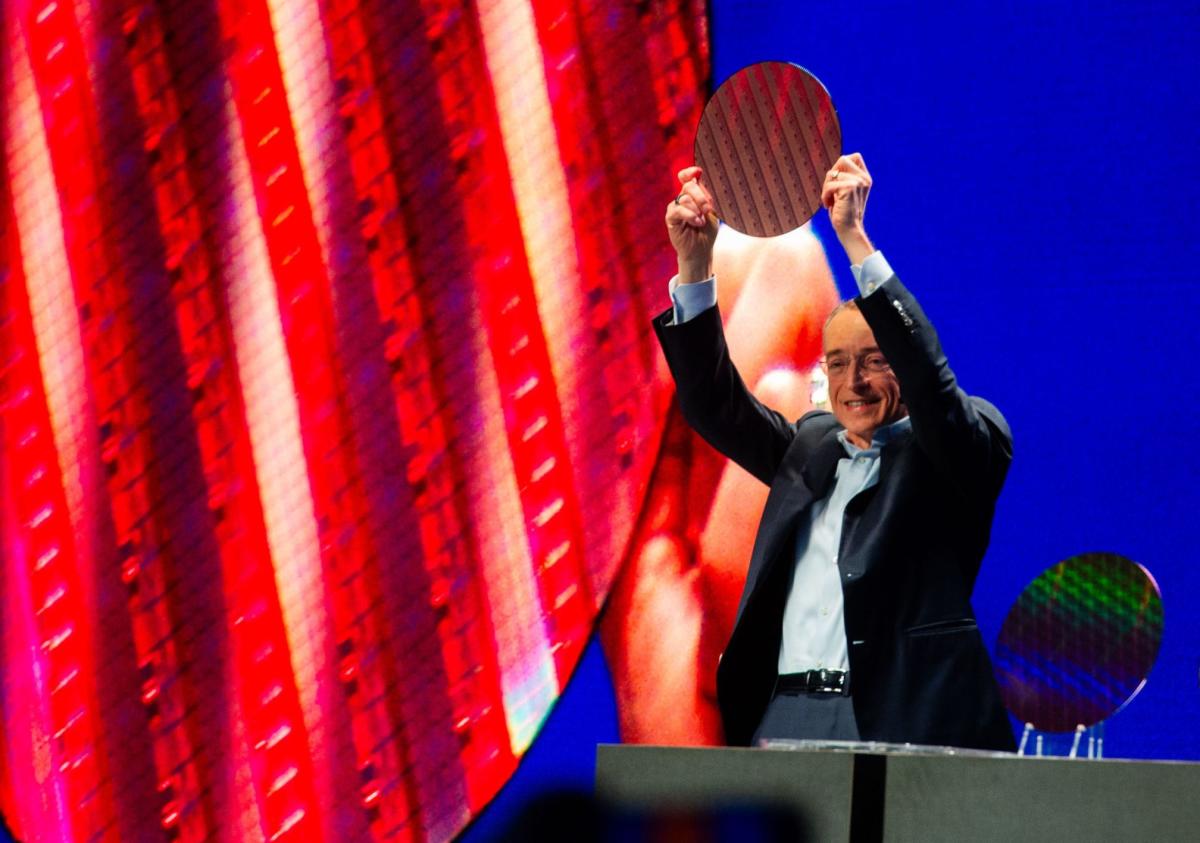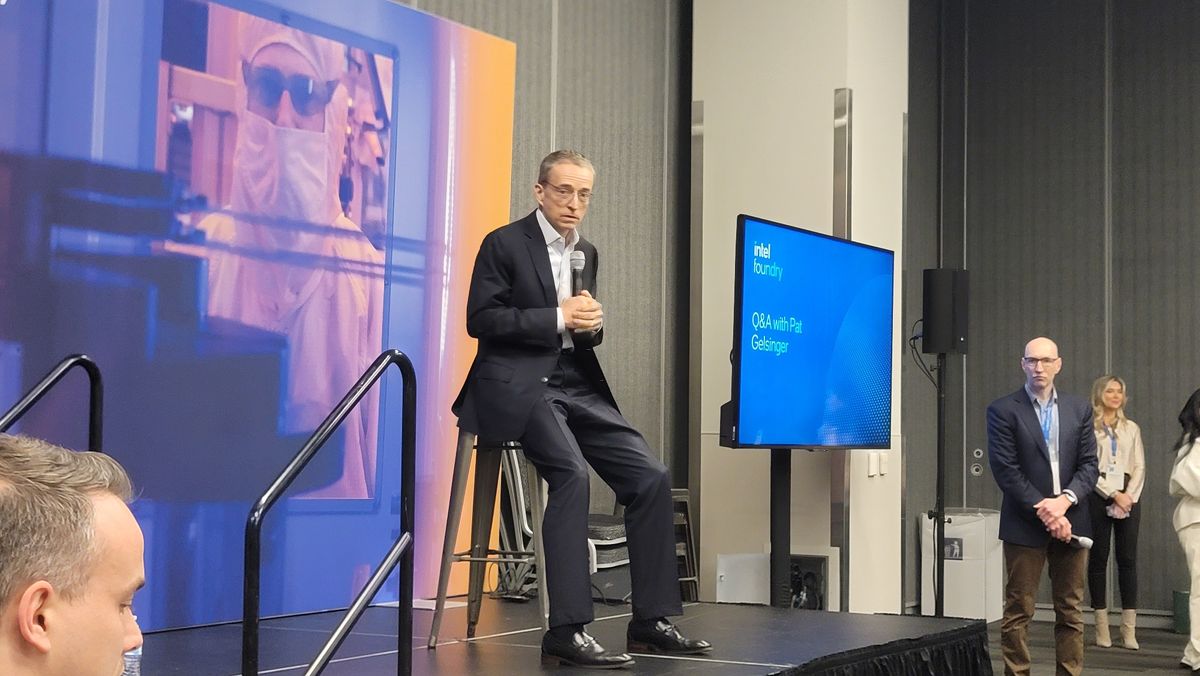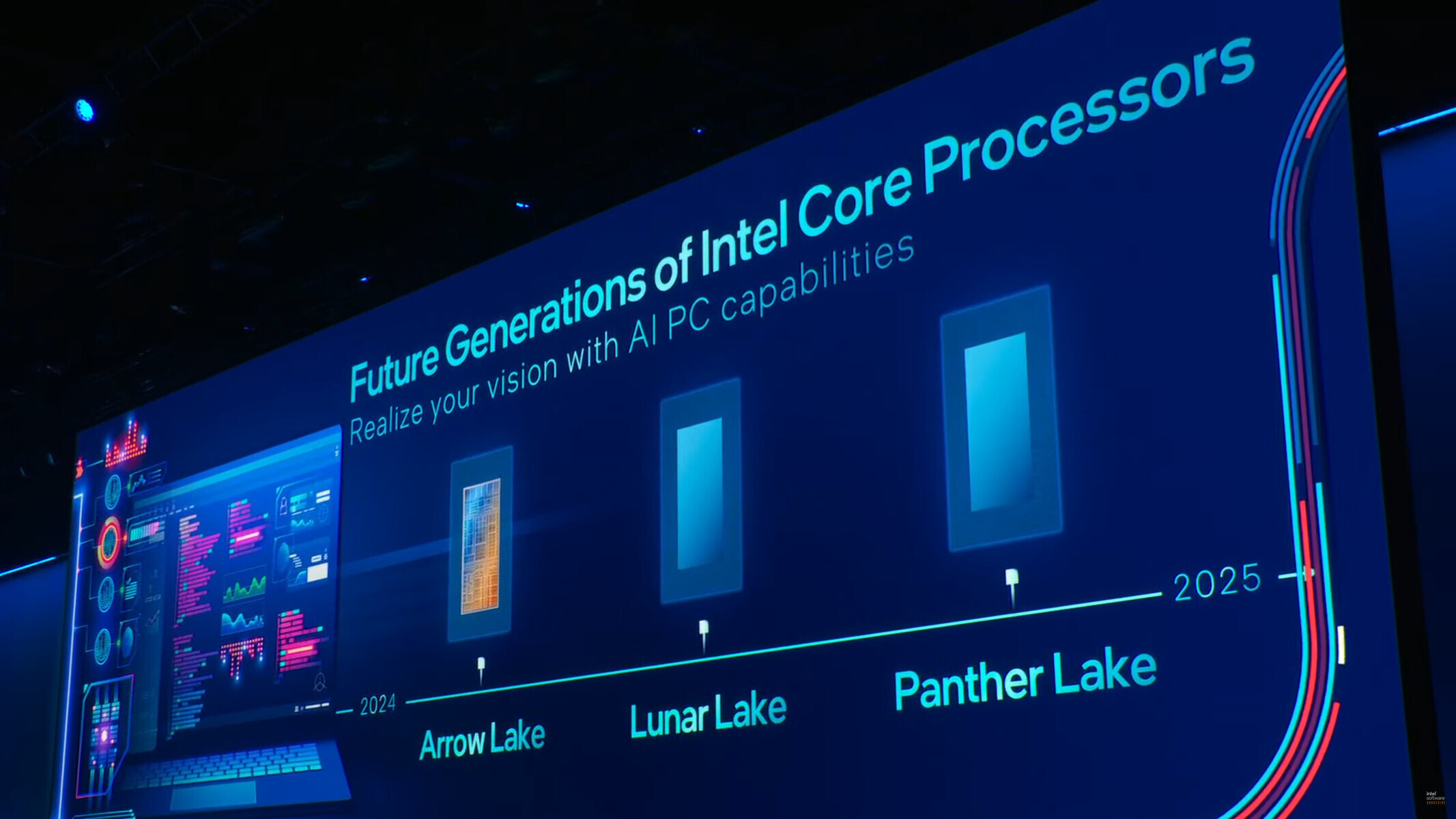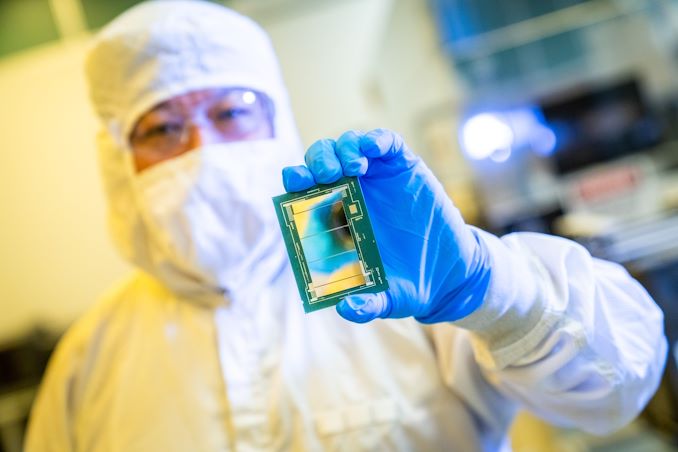Speculation: Intel will become fabless
Page 21 - Seeking answers? Join the AnandTech community: where nearly half-a-million members share solutions and discuss the latest tech.
You are using an out of date browser. It may not display this or other websites correctly.
You should upgrade or use an alternative browser.
You should upgrade or use an alternative browser.
- Oct 22, 2004
- 799
- 1,351
- 136
They are pretty much there now — Intel Product division a separate legal entity operating as a fabless design house. The question now is only whether this Samsung conglomerate model holds for the long term, or whether ownership will split down the road.
"Under the dramatic reorganization and rebranding, we now have Intel Foundry and Intel Product—separate legal entities that remain parts of the same overall company but even have their own sales forces and back-end business systems. Intel Foundry will obviously make the processors that Intel Product develops but via arm’s-length transactions. Intel Foundry’s other customers get strict confidentiality, and everyone’s welcome. “If we’re going to be the Western foundry at scale, we can’t be discriminating in who’s participating in that,” Gelsinger said yesterday.”

 finance.yahoo.com
finance.yahoo.com
"These organizations will be legally distinct and have their own staff and processes with minimal overlap to ensure confidentiality, explained IFS head Stu Pann. "We're very disciplined about this. We have two separate sales forces. We're building two separate ERP systems. We're outlining two separate legal entities," he said. "Intel Foundry will do arm's length transactions with the Product groups."
"Well, if you go back to the picture I showed today, Paul, there are [Intel Product] and [Intel Foundry], There's a clean line between those, and as I said on the last earnings call, we'll have [set up a] separate legal entity for [Intel Foundry] this year, " Gelsinger responded. "We'll start posting separate financials associated with that going forward. And the foundry team's objective is simple: Fill. The. Fabs. Deliver to the broadest set of customers on the planet. [...] So I want my foundry to be used by everybody. Period. We want to help build Nvidia chips, and AMD chips, and TPU chips for Google, and inference chips for Amazon. Period. We want to help them and give them the most powerful, performant, and efficient technologies for them to build their systems. Period. Full stop."

 www.tomshardware.com
www.tomshardware.com
The Intel CEO almost stamping his foot proclaiming he wants to build AMD chips to fill fabs — who would have thought that back in the day?
"Under the dramatic reorganization and rebranding, we now have Intel Foundry and Intel Product—separate legal entities that remain parts of the same overall company but even have their own sales forces and back-end business systems. Intel Foundry will obviously make the processors that Intel Product develops but via arm’s-length transactions. Intel Foundry’s other customers get strict confidentiality, and everyone’s welcome. “If we’re going to be the Western foundry at scale, we can’t be discriminating in who’s participating in that,” Gelsinger said yesterday.”
Intel splits itself in two to aid CEO Pat Gelsinger’s turnaround plans—and links up with archrival Arm
Intel Foundry, now a distinct entity from the chip-design side of the business, announces Microsoft as a customer.
"These organizations will be legally distinct and have their own staff and processes with minimal overlap to ensure confidentiality, explained IFS head Stu Pann. "We're very disciplined about this. We have two separate sales forces. We're building two separate ERP systems. We're outlining two separate legal entities," he said. "Intel Foundry will do arm's length transactions with the Product groups."
MSN
www.msn.com
"Well, if you go back to the picture I showed today, Paul, there are [Intel Product] and [Intel Foundry], There's a clean line between those, and as I said on the last earnings call, we'll have [set up a] separate legal entity for [Intel Foundry] this year, " Gelsinger responded. "We'll start posting separate financials associated with that going forward. And the foundry team's objective is simple: Fill. The. Fabs. Deliver to the broadest set of customers on the planet. [...] So I want my foundry to be used by everybody. Period. We want to help build Nvidia chips, and AMD chips, and TPU chips for Google, and inference chips for Amazon. Period. We want to help them and give them the most powerful, performant, and efficient technologies for them to build their systems. Period. Full stop."

Intel CEO Pat Gelsinger: I hope to build chips for Lisa Su and AMD
Cats and dogs, living together!
The Intel CEO almost stamping his foot proclaiming he wants to build AMD chips to fill fabs — who would have thought that back in the day?
Last edited:
Makes sense. No one would bat an eye about Samsung's intentions if Apple made chips there and same for Intel fabbing for AMD and NvidiaThe guy is desperate...
They aren't there yet, but it is obvious they are preparing to get there. I think they want to wait until they have more foundry business booked than internal Intel business and they'll announce the spin off. It won't be enough of a split to satisfy AMD or probably Apple at this point, they won't see them as separate until the foundry has its own stock symbol and CEO, and no interlocking board.
I don't know how quickly they can get that external business up to the level of their internal business, but safe to say they probably predict that happening within 3-4 years and will be disappointed if they don't. So I'd look for the split by say end of 2028.
I don't know how quickly they can get that external business up to the level of their internal business, but safe to say they probably predict that happening within 3-4 years and will be disappointed if they don't. So I'd look for the split by say end of 2028.
NTMBK
Lifer
- Nov 14, 2011
- 10,237
- 5,020
- 136
Damn, this thread is 6 years old.
(I'm feeling good about that Yes vote I made back then, along with 12% of other forum dwellers!)
(I'm feeling good about that Yes vote I made back then, along with 12% of other forum dwellers!)
beginner99
Diamond Member
- Jun 2, 2009
- 5,210
- 1,580
- 136
Not sure this will end well, the tight integration has always been the benefit of intel. If they now add bureaucracy, jt will make it harder to keep up. Pretty sure the products group will have to pay the foundry group like it was an customer thereby generating artificial paperwork and in general added bureaucracy.
DrMrLordX
Lifer
- Apr 27, 2000
- 21,631
- 10,841
- 136
Pretty sure the products group will have to pay the foundry group like it was an customer thereby generating artificial paperwork and in general added bureaucracy.
Foundry group's gotta show earnings somehow.
Saylick
Diamond Member
- Sep 10, 2012
- 3,157
- 6,373
- 136
Yeah, precisely this. Each half has historically been able to blame the other for their own faults, but if the fab side completely splits off and has their own management and financial goals then each half has no one to blame besides themselves. If each half wants to survive, it will have to learn to be successful independently of others.Foundry group's gotta show earnings somehow.
Gideon
Golden Member
- Nov 27, 2007
- 1,637
- 3,673
- 136
While that was absolutely true, we are already sorta passed that. Just look how much of upcoming processors (this year) is actually being fabbed in TSMC.Not sure this will end well, the tight integration has always been the benefit of intel.
This means the design teams have been working with other fabs already, on some projects nearly exclusively
FlameTail
Platinum Member
- Dec 15, 2021
- 2,304
- 1,238
- 106
While that was absolutely true, we are already sorta passed that. Just look how much of upcoming processors (this year) is actually being fabbed in TSMC.
This means the design teams have been working with other fabs already, on some projects nearly exclusively
TSMC is an absolute colossus. They are serving all the whales.
Intel, AMD, Nvidia, Apple, Qualcomm, Mediatek, Broadcom
Gideon
Golden Member
- Nov 27, 2007
- 1,637
- 3,673
- 136
Agreed, but i was talking specifically of this:TSMC is an absolute colossus. They are serving all the whales.
Intel, AMD, Nvidia, Apple, Qualcomm, Mediatek, Broadcom

Intel CEO Discloses TSMC Production Details: N3 for Arrow Lake & N3B for Lunar Lake
Intel CEO Pat Gelsinger engaged with press/media representatives following the conclusion of his IFS Direct Connect 2024 keynote speech—when asked about Team Blue's ongoing relationship with TSMC, he confirmed that their manufacturing agreement has advanced from "5 nm to 3 nm." According to a...
Gelsinger also confirmed the expansion of orders to TSMC, confirming that TSMC will hold orders for Intel's Arrow and Lunar Lake CPU, GPU, and NPU chips this year, and will produce them using the N3B process
Wouldn't quite call it "a tight integration with Intel's fabs". This is obviously only one product gen, but my point stands. The intel of today is already quite different from the one 3-5 years ago.
moinmoin
Diamond Member
- Jun 1, 2017
- 4,952
- 7,659
- 136
Finally the Intel Processor branding makes sense. It's designed by Intel Product and manufactured by Intel Foundry, completely logical. 🤡Intel Foundry and Intel Product
Not sure this will end well, the tight integration has always been the benefit of intel. If they now add bureaucracy, jt will make it harder to keep up. Pretty sure the products group will have to pay the foundry group like it was an customer thereby generating artificial paperwork and in general added bureaucracy.
They have no choice, Intel no longer has the scale to be a fab for its own products only. They need external customers to get the scale necessary to be able to compete with TSMC. They tried being a tightly integrated foundry last decade, it was an utter failure. No customers of any importance were willing to trust them. To gain full trust they will need to fully split, what they just announced is a step towards that end.
Also, it isn't "artificial paperwork" when they are separate reporting units, which will be separate business lines in the overall P&L. You think Samsung's fab division isn't invoicing the division selling Galaxy S for the LPDDR and NAND going in them, you think they just give it away with no revenue reflected on that division's books? Samsung's half split situation (similar to what Intel is now doing) shows the problem with that, their relationship with Apple being a great example. Apple got out of Samsung's fab as soon they were able, because they didn't want to help fund a competitor or allow them to potentially get advanced knowledge of Apple's plans.
Imagine if Samsung had fully split the fab back when Apple was doing their first fully custom SoC, the A6. Now Apple doesn't have incentive to ditch them for TSMC as soon as possible, so maybe all those billions Apple has poured into TSMC (some of it paid up front to help fund construction of new fabs, development of new processes, and so forth) had gone into Samsung instead. Maybe "Samsung foundry co" is the process leader (in reality, not just in their press releases) and as a result attract all the other whales like Qualcomm, Nvidia etc. that TSMC has in our reality. Samsung keeping everything under one corporate umbrella potentially cost them dearly (though we'll never know for sure unless someone has an alternate reality viewer handy)
Saylick
Diamond Member
- Sep 10, 2012
- 3,157
- 6,373
- 136
Let the spin-off begin!
They can’t sustain it. It wouldn’t matter if Intel’s design division were only facing a resurgent AMD at lesser intensity and hadn’t made mistakes — the capital intensity of fabrication now means exclusively vertical integration is not a cost winner unless Intel are realizing high volumes, and laptops/servers alone won’t cut that, especially as auto and AI among other sectors grow which funnels even more money and domain knowledge to competing fabs to iterate upon.Not sure this will end well, the tight integration has always been the benefit of intel. If they now add bureaucracy, jt will make it harder to keep up. Pretty sure the products group will have to pay the foundry group like it was an customer thereby generating artificial paperwork and in general added bureaucracy.
It just doesn’t make sense. All that R&D and fixed cost and limited amortization. It’s over for vertical integration in leading fabs.
TRENDING THREADS
-
Discussion Intel current and future Lakes & Rapids thread
- Started by TheF34RChannel
- Replies: 23K
-
Discussion Zen 5 Speculation (EPYC Turin and Strix Point/Granite Ridge - Ryzen 9000)
- Started by DisEnchantment
- Replies: 10K
-
Discussion Intel Meteor, Arrow, Lunar & Panther Lakes Discussion Threads
- Started by Tigerick
- Replies: 7K
-
-

AnandTech is part of Future plc, an international media group and leading digital publisher. Visit our corporate site.
© Future Publishing Limited Quay House, The Ambury, Bath BA1 1UA. All rights reserved. England and Wales company registration number 2008885.


